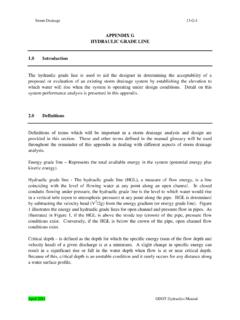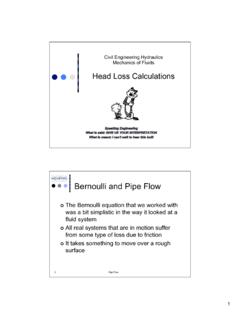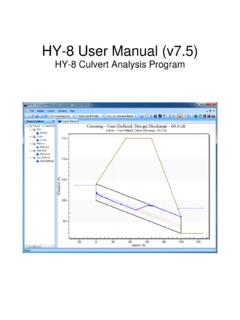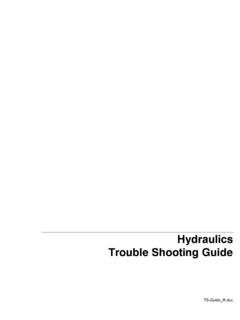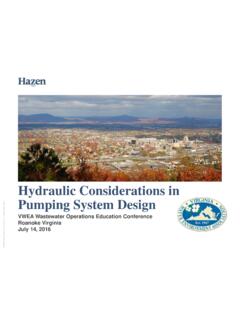Transcription of Electro-hydraulic Valves - A Technical Look
1 WHAT MOVES YOUR WORLDELECTRO- hydraulic Valves A Technical LOOK2 MOOG VALVE TYPES EXPLAINEDMoog Electro-hydraulic Valves Whenever the highest levels of motion control performance and design flexibility are required, you ll find Moog expertise at is a registered trademark of Moog Inc. and its subsidiaries. All trademarks as indicated herein are the property of Moog Inc. and its subsidiaries. For the full disclaimer refer to the most current information, visit or contact your local Moog ..2 About Moog, Applications, Assistance ..3 MOOG VALVE TYPES EXPLAINED ..5-9 Servo and Proportional Valves ..5 Directly and Pilot Operated Valves ..6 Electrical and Mechanical Feedback Valves .
2 7 EFB Valves with Analog or Digital Electronics ..8 Pressure and Flow Control and Axis Control Valves ..9 OPERATING PRINCIPLES ..10-15 Nozzle Flapper Operated Valves ..11-12 Servo Operated Valves ..13 Linear Force Motor Operated Valves ..14-15 VALVE SIZING ..16-21 PRACTICAL CONSIDERATIONS WHEN LAYING OUT EH CONTROL SYSTEMS ..22-29 Position, Velocity and Pressure/Force Control Circuits .. 23-24 General Electro-hydraulic System Layout ..25-29 ROUTINE MAINTENANCE ..30-333 MOOG VALVE TYPES EXPLAINEDMoog Electro-hydraulic ValvesELEcTRO- hydraulic Valves A Technical LOOk About this GuideWe have been producing Electro-hydraulic servo Valves since 1951.
3 Since then, our experts have had countless discus-sions with our customers about their applications and how to use our Valves to achieve the best performance for their applications. We have written this guide to deal with topics that are essential for making the best use of our will start by explaining the basics about our different valve types, which include servo Valves , proportional Valves , EFB Valves and MFB Valves , and we ll also describe the functional principles of the typical Moog Valves . We will then give guidance about selecting and sizing the optimal valve for your application. After that, we will offer some practical consid-erations for laying out Electro-hydraulic control systems.
4 Finally, we will provide some thoughts on system and valve maintenance to make sure your Moog Valves have a long Servo and Proportional Valves are found across a wide range of markets and applications. From metal forming, wood processing and plastics machinery to test and simulation equipment and offshore and marine applications, when-ever high-performance control is needed, you will find Moog example, Moog Valves accurately control the thickness of sheet steel in steel mills as well as paper in paper mills. They control all major and many minor functions in plastic injection molding machines. They also control the stability of offshore oil drilling platforms in rough and hazardous conditions and the fuel injection process in marine diesel of these applications involves precise control of a complex structure, which in most cases is subject to varying loads that can adversely affect performance.
5 Moog products overcome the structural and load variation effects through the principles of feedback. Moog transducers measure an output, which includes position, velocity, pressure or acceleration, and send signals to the machine controller. These signals are then compared with the desired output. The sensing and cor-responding correction on a continuous basis results in optimum system information in this brochure represents typical products offered by Moog; our expertise is helping you solve your motion control problems. Our sales and engineering experts will assist you in your efforts to accurately and precisely control position, velocity or force in your specific application. Often times this results in developing a customized design and product, specifically suited to your need.
6 Our capabilities in this respect are unmatched in the industry. Contact us and let us know how we can we are continually improving our products through research and development, we will from time to time change specifications in this catalog without notice. Please contact us prior to making any calculations or purchased based on this Moog Electro-hydraulic ValvesMOOG VALVE TYPES EXPLAinED MOOG VALVE TYPES EXPLAINEDSome basic information about Moog Servo and Proportional Valves and their different MOOG VALVE TYPES EXPLAINEDMoog Electro-hydraulic ValvesMOOG VALVE TYPES EXPLAinED Moog produces many different valve types to suit the different applications of our customers. If you ever asked yourself what the difference between a servo and a proportional valve is, what an MFB or an EFB valve is or what a pQ valve or ACV can do, then you should read this and Proportional ValvesServo Valves are usually perceived as high-end Valves that are used to get the maximum performance out of your machine, while proportional Valves are seen as all-round Valves used for basic applications.
7 The main difference between a servo and a proportional valve is the spool overlap in the center position. While a servo valve has a spool overlap of <3% of the spool stroke, a proportional valve has an overlap of 3% or more (as defined in ISO 5598).This usually leads to servo Valves being built with a spool that is sliding inside a hardened steel bushing, while propor-tional Valves have the spool sliding directly inside the cast iron valve housing (Moog also builds proportional Valves with a bushing spool assembly). The layout and the main characteristics of both Valves is shown Servo ValvesXYTAPT1 BFeatures Bushing-spool (BSA) design Spool overlap < 1% Very high pressure gain Very high accuracy and dynamics Rated flow specified at 70 bar (1,000 psi) pressure dropSpool sliding in hardened steel bushingMoog Proportional ValvesXYTAPT1 BFeatures Spool-in-Body (SiB) design Spool overlap 3% or more Lower accuracy and dynamics than servo Valves Higher rated flows than servo Valves Nominal flow specified at 10 bar (150 psi)
8 Pressure dropSpool sliding in valve housing6 MOOG VALVE TYPES EXPLAINEDMoog Electro-hydraulic Valves MOOG VALVE TYPES EXPLAinEDDirectly and Pilot Operated ValvesDirectly operated Valves are Valves where the spool is mechanically attached to the actuator and directly moved by it. To limit the size and cost of these actuators, the operating forces have to be limited. Since the forces necessary to move a spool are increasing with flow and pressure drop, directly operated Valves are usually limited to smaller flows and thus smaller valve sizes. Moog Directly Operated Valves are mostly driven by a Linear Force Motor and called Direct Drive Valves (DDV).To increase the spool actuation force, the main spool of pilot operated Valves is operated hydraulically by a pilot valve.
9 By hydraulically amplifying the electrical command signal, pilot operated Valves can reach very high spool actuation forces and thus be built up to very large rated flows. The pilot valve is usually a smaller, directly operated valve that is specially designed to be used as a pilot valve. Moog usually uses nozzle flapper, jetpipe or direct drive spool pilot Valves . Sometimes, even two-stage pilot operated Valves are used as pilot Valves to increase Direct Drive (DDV) ValvesPTAYBF eatures Actuated by Linear Force Motor (LFM) with push-pull operation Low internal leakage losses Low energy consumption in center position Dynamics mostly independent from supply pressure Higher forces than proportional solenoids, thus higher pressure drops possibleMoog Pilot Operated ValvesXYTAPBTVBVPVAVF eatures Pilot principles.
10 Nozzle flapper ServoJet Direct Drive Valve High flow rates Available as servo and proportional Valves Available with mechanical or electrical feedback7 MOOG VALVE TYPES EXPLAINEDMoog Electro-hydraulic Valves MOOG VALVE TYPES EXPLAinEDElectrical and Mechanical Feedback ValvesAll Moog Servo and Proportional Valves are equipped with a closed loop spool position control and thus require a spool position feedback. Moog uses two different types of feedback: Mechanical and electrical feedback. Mechanical feedback (MFB) Valves include a feedback spring that is tensed by the spool deflection and gives a mechanical feedback to the torque motor. These Valves do not need onboard electronics to operate.
